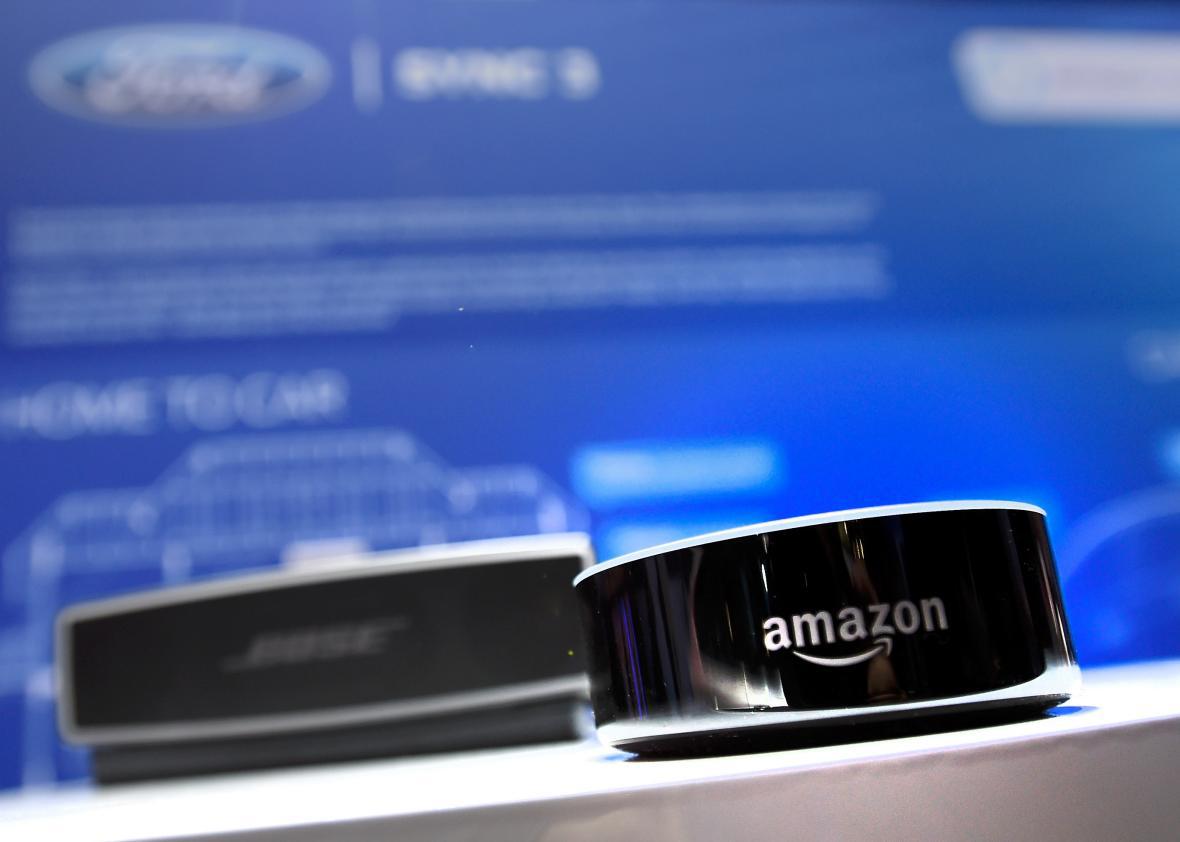
David Becker/Getty Images
Odds are, if you have an Amazon Echo, you call it Alexa. If you talk to your iPhone (or, eventually, a HomePod), you call it Siri. And if you have a Google Home, you call it Google.
It doesn’t have to be this way. In Salon this week, Texas-based technology attorney Stephen Harrison made a surprisingly persuasive case that we should be calling all of our personal assistants by the same name: “Computer.”
Before delving into his reasons—and there are several good ones, beyond the obvious Star Trek allusion—it’s worth noting that Amazon is the only one of the major tech companies that actually allows you to rename its voice assistant “Computer.” Apple lets you change Siri’s voice—e.g., from female to male, which I highly recommend if only as a small act of anti-sexism—but not its name. Google folllowed suit by adding a male voice in October. Microsoft (whose voice assistant is called Cortana) doesn’t even let you do that much.*
That said, there’s nothing stopping those other companies from following Amazon’s lead in the future. And if you have an Echo, there’s nothing stopping you from changing what you call it right now. (Here’s how.)
Harrison explains:
The more we say “Amazon” or “Alexa,” the more we are allowing one company to functionally and emotionally permeate our lives. It’s the equivalent of paying regular tribute to one corporate dictator. We might as well say, “Big Brother, do I need a jacket?” or “Big Brother, order soy milk.”
“Computer” is not specific to a single company. It does not force us to verbalize our brand loyalty. It’s completely neutral. And that’s its saving grace.
That’s a good high-level summation of the argument. But there’s more. For starters: All the people named Alexa whose lives have been made difficult by the smart speaker’s popularity. More generally, Harrison notes, voice assistants are supposed to be convenient. A world in which voice assistants proliferate, but each has a different name, is a world in which commanding machines becomes an exercise in frustration. Harrison imagines stumbling into one’s hotel room late at night and spluttering:
“Echo, turn on the lights! Okay Google, turn on the lights! Siri, please turn on the lights! Marriott International, turn on the lights! Hilton Rewards Artificial Intelligence Customer Satisfaction Protocol, TURN ON THE F—IN’ LIGHTS!!!”
Annoying as that sounds, the best reason to call voice assistants “computer” is simply that it reminds us they are not human. That might feel relatively obvious today, when the A.I. behind them is primitive enough that you have to formulate your commands in specific ways. Even so, people are already cursing at them and befriending them as though they’re moral agents with intentions and feelings. As the technology improves, interactions will become ever more natural, and the temptation to treat A.I. assistants like people will grow.
It’s not an accident that tech companies have (mostly) given their voice bots human-sounding names, voices, and even distinct personalities. As I wrote in 2016, their anthropomorphic qualities subtly encourage people to trust them and build relationships with them. That benefits the companies who make them, because it gives them not only more data on us, but ever-greater influence over our choices.
On a recent episode of our new podcast If Then, my co-host April Glaser highlighted the flipside of that coin in a brief review of the Google Home. Saying “Hey Google” all the time, she noted, made her feel like there was a giant corporation sitting on her kitchen table. No doubt that’s off-putting—but it’s also basically accurate, and we’d do well to remember it if we’re going to integrate these assistants ever more tightly into our lives. Calling our assistants “computer” accomplishes much the same, minus the awkwardness of having to talk to a corporate brand 50 times a day.
Harrison told me in an email that he’s gotten a lot of feedback on his proposal. One common objection is that people say “computer” too often in everyday conversation. But it shouldn’t be too hard to program the software to infer from tone and context whether it’s being directly addressed. Another is that the term feels increasingly anachronistic: Several respondents brought up the iPad Pro commercial in which a kid asks, “What’s a computer?” That doesn’t strike me as a real obstacle, but it’s easy enough to imagine alternative, equally generic wake words if others find “computer” inapt: “device,” “machine,” and “robot” come to mind.
What’s nice about “computer,” though, is that it directly links our newest form of personal device to generations of hardware that have come before, which implicitly demystifies it. “Alexa” might delight, annoy, amuse, or endear us. “Computer” just a gadget that does what it’s been programmed to do, typically by employees of a corporation with its own profit motive at heart. The more sophisticated the software gets, the harder—and more important—that will be to keep in mind.
*Correction, Dec. 1: This article originally said that Google does not allow users to change the voice of its voice assistant. It now does.